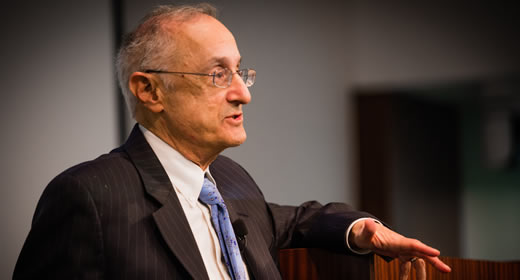
In hostile political times, it's no wonder the research into how to encourage cooperation is proving more and more alluring. On the April 11, 2019, episode of Science History Podcast, host Frank von Hippel digs into such questions with Professor Robert Axelrod, whose research in the area has spanned continents and disciplines.
The two began their discussion by rehashing a famous experiment Axelrod conducted in 1979, where he structured a computer competition based on the prisoner's dilemma to witness different solutions toward encouraging cooperation. Surprisingly, the winner was one of the simplest answers: a tit-for-tat, where equivalent retaliation is accounted for, thereby leveling wins and losses. "The prisoner's dilemma and other zero-sum games illustrate that, in fact, you can do very well without beating the other guy by encouraging them to behave in a way that helps you as well as them," explained Axelrod.
But do these lessons hold water, particularly in more complex environments than early computer simulations could provide? Axelrod has continued to prove so, applying such findings recently in an activity with scholars and think tanks in China looking into how to foster cyber norms to prevent cyberwarfare.
They also discussed the application of Axelrod's research into fields other than international relations and political science. His work has been applied by biologists and oncologists, looking into everything from evolution to cancer spread. Still, Axelrod says the overarching lesson continues to harken back to that 1979 simulation. "The biggest lesson for me is don't fall into the zero-sum trap," cautioned Axelrod, going on to say "Whenever we think of things as a rivalry or a competition, we tend to immediately fall into the simple-minded thinking that it's a zero-sum game...it's usually opportunities that are mutually advantageous that are overlooked if you take that approach."
To hear the full podcast, click here
Robert Axelrod, member of the National Academy of Sciences and former MacArthur Prize Fellow, is the Walgreen Professor for the Study of Human Understanding at the University of Michigan. He has appointments in the Department of Political Science and the Gerald R. Ford School of Public Policy. His books include "The Evolution of Cooperation," and "The Complexity of Cooperation.”